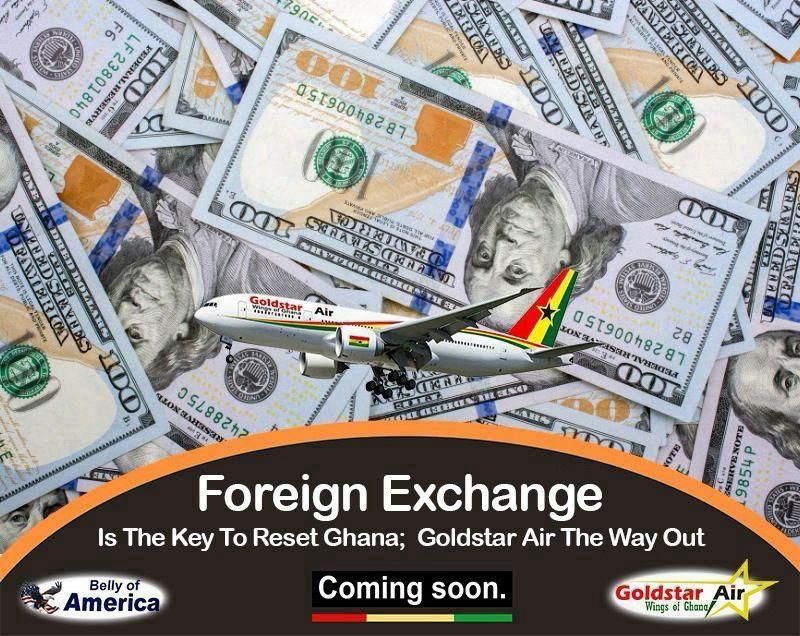Intercontinental airline Goldstar Air, a private Ghanaian and United States-registered company with no liabilities as of today and an issued Air Carrier License (ACL) from the Ghana Civil Aviation Authority (GCAA) to operate international passenger and cargo flights. The airline is well-prepared as the way out to drive foreign exchange inflows to the country for the airline’s Project $1 Trillion Foreign Reserves initiative, through ticket sales in international currencies, air cargo services, tourism, and business travel is the key to reset Ghana.
Goldstar Air is advising the new administration that Ghana Civil Aviation Authority must get a qualified third-party certification team within this month to complete the airline’s remaining phases of its Safety Certificate (AOC), as the airline is above halfway through the certification process, there is no time to waste to start the 24-hour economy to create over two million direct and indirect job opportunities for Ghanaians. The Ghanaian youth cannot wait any longer in the ghettos. they need their well-paying jobs.
Foreign exchange is a vital component of economic development, serving as the backbone of international trade, investment, and economic stability. For Goldstar Air, the need to generate and sustain foreign exchange reserves is more critical than ever, as it directly affects the nation’s ability to import essential goods, service international debts, and stabilize the local currency, the Ghanaian cedi.
Goldstar Air is poised to revolutionize Ghana’s economy with an ambitious yet achievable target: mobilizing a staggering $1 Trillion in reserves to sustain the 24-hour economy. This bold initiative will catapult Ghana into a new era of unprecedented growth, innovation, and prosperity, solidifying its position as a global economic powerhouse. With unwavering confidence and determination, Goldstar Air is committed to making this vision a reality.
Central banks throughout the world sometimes cooperate in buying and selling official international reserves to influence exchange rates and avert financial crises. Ghana’s economy heavily relies on imports, which require substantial amounts of foreign exchange to facilitate trade. The country imports refined petroleum, machinery, automobiles, pharmaceuticals, and food products, among others. Goldstar Air is the key to reset this trend by spearheading a shift from import dependence to 24-hour export-led industrialization.
Export-led growth is important for two main reasons. First, it improves the country’s foreign currency reserves and helps reduce debt, provided the necessary facilities and materials for exports are in place. Second, and more debatably, increased export growth can trigger higher productivity, creating a positive, upward spiral that leads to even more exports.
Goldstar Air will be a significant driver of foreign exchange earnings across various sectors of the Ghanaian economy. The airline emerges as a transformative force in harnessing this potential. As the wings of Ghana and the belly of America, with ambitious international plans, the airline is strategically positioned to contribute to Ghana’s foreign exchange reserves through increased trade, employment, and investment opportunities.
Ghana’s weak foreign exchange reserves place immense pressure on the cedi, resulting in inflation, high living costs, and economic instability. One of the most effective ways to address this challenge is by generating substantial foreign exchange earnings through increased exports and the attraction of international revenue. Aviation plays a crucial role in this process, as airlines facilitate the movement of people, goods, and services across borders.
The International Air Transport Association (IATA) announced its financial outlook for the global airline industry in 2025, which shows a slight strengthening of profitability amid ongoing cost and supply chain challenges. Total industry revenues are expected to be $1.007 Trillion. That is an increase of 4.4% from 2024 and will be the first time that industry revenues top the $1 Trillion mark. Expenses are expected to grow by 4.0% to $940 billion. Passenger numbers are expected to reach 5.2 billion in 2025, a 6.7% rise compared to 2024 and the first time that the number of passengers has exceeded the five billion mark. Cargo volumes are expected to reach 72.5 million tonnes, a 5.8% increase from 2024.
Goldstar Air is committed to spearheading a transformative 24-hour economy in Ghana. To achieve this vision, the airline will collaborate with key private sector stakeholders to leverage the country’s natural resources such as Gold, Cocoa, Diamonds, Crude oil, Timber, Lithium, Tourism, and Agribusiness to mobilize a targeted, ambitious, and achievable amount of the $1 trillion in reserves. This unprecedented initiative will strengthen the Ghanaian currency and fuel the implementation of a vibrant 24-hour economy, unlocking unparalleled growth, job creation, and prosperity for Ghana, while cementing its position as a beacon of economic excellence in Africa, by settling its debt early enough so that the country does not put investor confidence and future partnerships between Ghana and American firms at risk, as indicated by the United States Ambassador to Ghana Virginia Palmer addressing a section of journalists in Accra.
The airline has positioned itself as a key player in Ghana’s aviation industry, with international flight operations that will create a direct avenue for foreign exchange earnings by connecting Ghana to major global destinations. International travelers purchasing tickets from the airline will bring foreign currency into the economy, helping to strengthen the country’s reserves.
Cargo transportation is another avenue through which Goldstar Air will generate foreign exchange revenue. Ghana exports a wide range of commodities, including cocoa, gold, timber, and fresh agricultural produce. The ability to transport these goods quickly and efficiently to international markets is crucial for sustaining foreign exchange earnings.
Currently, many Ghanaian exporters rely on foreign cargo airlines, resulting in significant forex outflows due to high freight costs and payments made to international carriers. By investing in a dedicated cargo fleet, Goldstar Air will ensure that Ghanaian businesses can export goods using a Ghanaian-registered carrier, reducing capital flight and increasing the nation’s forex reserves.
Goldstar Air’s ambitious plans, including the establishment of a maintenance base, a catering center, and a training school will attract international partnerships and funding, leading to increased forex inflows.
The presence of Goldstar Air, a strong Ghanaian-based international airline, will boost investor confidence and attract foreign direct investment (FDI) into the aviation sector. A robust aviation industry will signify a stable and growing economy, encouraging multinational corporations, tourism businesses, and hospitality investors to expand their operations in Ghana.
Chairman and Chief Executive Officer of Goldstar Air, Eric Bannerman, emphasized that the airline’s plan to operate Hajj flights from five airports in Ghana is another means of earning foreign exchange. Each year, thousands of Ghanaian Muslims travel to Mecca for the Hajj pilgrimage, with many relying on foreign airlines. By providing dedicated Hajj flights, Goldstar Air will ensure that the millions of dollars spent on airfare for this religious journey remain in the country. Additionally, chartered flights for religious tourism to other destinations, such as Israel and Rome will further contribute to forex earnings. As one of Africa’s emerging airlines, Goldstar Air is positioned to benefit from increased intra-African flights, allowing Ghana to capture forex earnings from African travelers who would otherwise use non-African carriers.
Another significant advantage of Goldstar Air’s presence is the reduction of forex leakage due to ticket purchases on foreign airlines. Currently, a large portion of Ghanaian travelers use non-Ghanaian carriers for international flights, resulting in substantial amounts of forex leaving the country. If more Ghanaians choose to fly with a Ghanaian-registered carrier, the forex generated from ticket sales will remain within Ghana, helping to stabilize the cedi and reduce the balance of payments deficit.
The benefits of a thriving aviation industry extend beyond the airline itself, as it stimulates growth in related sectors such as hospitality, transportation, and trade. When more international travelers arrive in Ghana, hotels, restaurants, car rental services, and local businesses benefit from increased patronage. This leads to a multiplier effect, where foreign currency circulates within the economy, supporting small and medium-sized enterprises (SMEs) and strengthening Ghana’s financial stability.
Strong aviation industry contributes significantly to employment creation, which in turn boosts foreign exchange earnings. The airline industry generates thousands of jobs, ranging from pilots and cabin crew to ground staff, engineers, and administrative personnel. When a Ghanaian-registered carrier such as Goldstar Air expands, it will create employment opportunities for Ghanaians, reducing dependency on foreign expatriates who often repatriate their earnings. Additionally, with the right training and infrastructure, Goldstar Air will position Ghana as a hub for aviation training, attracting foreign students and professionals who will pay for aviation courses using international currencies.
Evidence shows that Gross Domestic Product (GDP) growth and employment growth increase in response to positive shocks in foreign currency reserves (forex reserves) accumulation. In a few years, Goldstar Air will help mobilize a targeted and ambitious amount of $1 Trillion in reserves, a move that will drastically reduce the current unemployment rate of 14.7 percent.
Foreign exchange reserves (also called forex reserves or FX reserves) are cash and other reserve assets, such as gold and silver held by a central bank or other monetary authority that are primarily available to balance a country’s payments, influence the foreign exchange rate of its currency, and maintain confidence in financial markets. Reserves are held in one or more reserve currencies, nowadays mostly in the United States dollar and, to a lesser extent, the euro.
Foreign exchange reserve assets can comprise banknotes, bank deposits, and government securities of the reserve currency, such as bonds and treasury bills. Some countries also hold a portion of their reserves in gold, while Special Drawing Rights (SDRs) are also considered reserve assets.
The modern exchange market, as tied to the price of gold, began in 1880. In that year, countries with significant reserves included Austria-Hungary, Belgium, the Canadian Confederation, Denmark, the Grand Duchy of Finland, the German Empire, and Sweden-Norway.
Official international reserves, the means for official international payments, formerly consisted only of gold, and occasionally silver. But under the Bretton Woods system, the US dollar functioned as a reserve currency and became part of nation’s official international reserve assets. From 1944 to 1968, the US dollar was convertible into gold through the Federal Reserve System. But after 1968, only central banks could convert dollars into gold from official gold reserves, and after 1973, no individual or institution could convert US dollars into gold from official gold reserves.
Since 1973, no major currencies have been convertible into gold from official gold reserves. Individuals and institutions must now buy gold in private markets, just like any other commodity. Even though the US dollar and other currencies are no longer convertible into gold from official gold reserves, they still can function as official international reserves.
Goldstar Air, the wings of Ghana and belly of America is committed to significantly contributing to Ghana’s economic growth by offering innovative and pragmatic 24-hour direct and indirect strategic services that will create more job opportunities. By strategically focusing on various sectors, Goldstar Air not only aims to enhance its operational efficiency but also to boost employment, skill development, and overall economic prosperity.
The airline’s 24-hour service to key global markets such as the United States, United Kingdom, United Arab Emirates, China, and several European and African countries will enable Ghana to tap into the large volumes of foreign exchange circulating in these economies. Airlines based in countries with strong international routes consistently generate significant forex earnings through ticket sales, in-flight services, and partnerships with foreign travel agencies. Goldstar Air’s vision of expanding its network will ensure that a greater proportion of forex transactions remain in Ghana, rather than being repatriated by foreign-owned airlines operating in the country.
Aviation also plays a crucial role in medical tourism, an industry that has the potential to generate substantial forex earnings for Ghana. Many Ghanaians travel abroad for medical treatment, spending millions of dollars annually in countries such as India, United States, South Africa and the United Kingdom. However, with improved healthcare facilities, Ghana has begun positioning itself as a medical tourism hub, attracting patients from neighboring African countries with the help of institutions such as the University of Ghana Medical Center (UGMC), the Bank Hospital, and the Greater Accra Regional Hospital (Ridge Hospital), among others, with more such facilities planned. Goldstar Air will establish specialized medical evacuation services, ensuring that high-net-worth individuals seeking healthcare in Ghana travel with a trusted Ghanaian-registered airline.
The adoption of a 24-hour work schedule has significantly impacted the economies of major countries such as the United Kingdom, China, France, Australia, Canada, Mexico, and the United States. By operating around the clock, businesses and services can boost productivity, enhance customer satisfaction, and foster economic growth.

When examining the worth of some global market revenues, such as Aviation ($3.5 Trillion), Chocolate ($150 Billion), Tourism ($8.8 Trillion), Gold Ornaments ($100 Billion), Fashion ($3 Trillion), Beauty and Makeup ($700 Billion), Movies and Entertainment ($200.38 Billion), Sports ($2.65 Trillion), Cargo ($2.2 Trillion), Music Copyright ($45.5 Billion), Courier Services ($485 Billion), Food and Beverage ($550 Billion), Aviation Insurance ($466.79 Billion), Maintenance, Repair, and Overhaul (MRO) ($104 Billion), and In-flight Catering ($22 Billion), it becomes evident that Ghana can seriously tap into these income streams.
Goldstar Air, Ghana’s economic tool has the potential to unlock the current economic crisis and reduce the high inflationary rate facing the country. The airline will also create over two million well-paying job opportunities for Ghanaians. This job creation projection is very moderate, considering that many other sectors will also benefit indirectly. By instilling confidence in the economy, the airline is positioned as a key driver of business expansion and sustainable job growth.
Mr. Bannerman believes that tourism remains one of the highest foreign exchange earners for many economies. Therefore, all three arms of government and the entire Ghanaian economy can receive sufficient funds to run a non-deficit budget. In a nutshell, foreign exchange is the key to resetting Ghana and Goldstar Air is the way out.
The successful Year of Return and Beyond the Return campaigns demonstrated the immense potential of heritage and cultural tourism in Ghana. Thousands of African diasporans from the United States, the Caribbean, and Europe traveled to Ghana, injecting millions of dollars into the economy through spending on accommodation, food, transport, and entertainment. Goldstar Air is uniquely positioned to facilitate the growth of tourism by providing affordable and accessible flights for international visitors. With strategic marketing and airline partnerships, Goldstar Air will attract tourists who wish to explore Ghana’s castles, beaches, festivals, and wildlife through the airline’s tourism campaign, Home Sweet Home.
Goldstar Air will additionally tap into heritage tourism to expand the market for business and conference tourism. Ghana is increasingly becoming a preferred destination for international summits, trade fairs, and diplomatic events. The African Continental Free Trade Area (AfCFTA) headquarters in Accra, Ghana has already begun drawing global investors and business executives into the country. With a well-structured flight network, Goldstar Air can serve this market effectively, ensuring that foreign business travelers spend their money within the Ghanaian economy.
Goldstar Air’s commitment to digitalization will also enhance forex earnings. With online booking systems, mobile apps, and seamless payment gateways, international passengers can easily purchase tickets using their preferred foreign currencies. The adoption of e-commerce within the airline’s ecosystem will further boost forex inflows, ensuring that Ghana remains at the forefront of the digital aviation revolution.
The modernization of Ghana’s aviation infrastructure will further enhance Goldstar Air’s ability to generate more forex. Investment in airport expansion, improved runways, and state-of-the-art terminals will increase Ghana’s attractiveness as a regional aviation hub. Additionally, partnerships with global aviation organizations, alliances and codeshare agreements with other airlines, and the adoption of cutting-edge aviation technology will ensure that Goldstar Air remains competitive in the global market.
Foreign exchange is a crucial driver of economic growth, and the airline will significantly contribute to Ghana’s economic stability. By retaining forex earnings within the country and expanding Ghana’s reach in the global aviation market, Goldstar Air stands as the gateway to resetting Ghana’s economy and positioning the nation as a competitive force in the international aviation industry.
Goldstar Air, the wings of Ghana and the belly of America, is ambitious in providing scheduled and non-scheduled passenger and cargo air services, initially to North America, Europe, Asia, the Middle East, and Africa. The airline has chosen Washington, Rhode Island, London, Dubai, Guangzhou, Toronto, Milan, Hamburg, Madrid, Rome, Düsseldorf, Lagos, Freetown, Banjul, Conakry, Dakar, Monrovia, and Abidjan from Ghana as major originating cities for its initial operations. Direct non-stop services will be deployed where necessary.
#Flygoldstar
#WingsOfGhana
#BellyOfAmerica
#OverTwoMillionJobOpportunities


